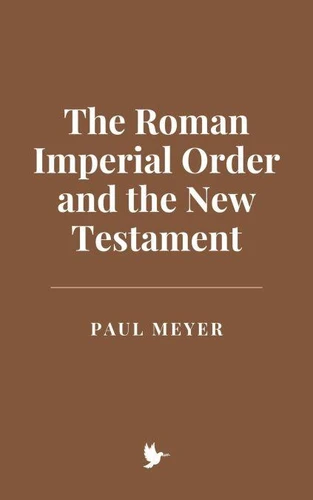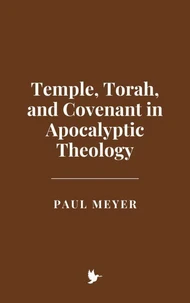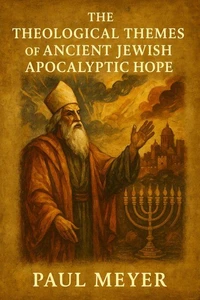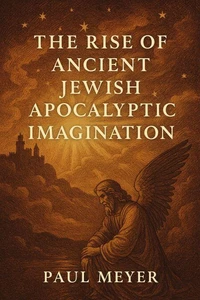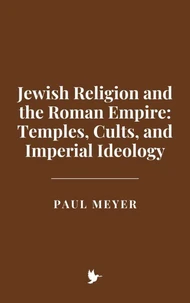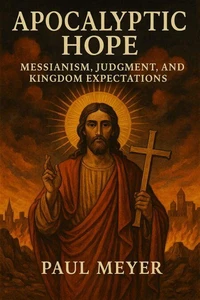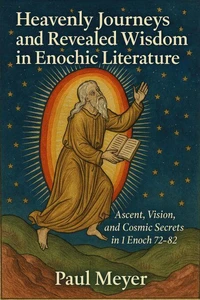The Roman Imperial Order and the New Testament
Par :Formats :
Disponible dans votre compte client Decitre ou Furet du Nord dès validation de votre commande. Le format ePub est :
- Compatible avec une lecture sur My Vivlio (smartphone, tablette, ordinateur)
- Compatible avec une lecture sur liseuses Vivlio
- Pour les liseuses autres que Vivlio, vous devez utiliser le logiciel Adobe Digital Edition. Non compatible avec la lecture sur les liseuses Kindle, Remarkable et Sony
 , qui est-ce ?
, qui est-ce ?Notre partenaire de plateforme de lecture numérique où vous retrouverez l'ensemble de vos ebooks gratuitement
Pour en savoir plus sur nos ebooks, consultez notre aide en ligne ici
- FormatePub
- ISBN8230923978
- EAN9798230923978
- Date de parution31/12/2024
- Protection num.pas de protection
- Infos supplémentairesepub
- ÉditeurIndependently Published
Résumé
This work explores the profound interplay between the Roman Imperial Order and the New Testament, offering a comprehensive analysis of how the socio-political, cultural, and religious frameworks of the Roman Empire shaped the context, message, and development of early Christianity. Spanning twenty chapters, the study delves into the dynamics of power, identity, and resistance, tracing the evolution of the Christian faith from its origins in Roman-occupied Judea to its eventual transformation into the dominant religion of the empire under Constantine.
Key themes include the theological redefinition of power and authority, as exemplified by the crucifixion and resurrection of Jesus; the tension between Christian allegiance to God and Roman demands for civic and religious conformity; and the role of early Christian writings, particularly the Gospels, epistles, and Revelation, in articulating a vision of the Kingdom of God that subverted imperial ideology.
The experiences of persecution and martyrdom, the adaptive strategies of Christian communities in urban centers, and the theological responses to Roman legal and cultural structures are examined in depth. Drawing on primary sources such as the New Testament, Roman legal documents, historical accounts, and inscriptions, as well as the works of early Christian writers like Tertullian, Ignatius, and Eusebius, the study situates Christianity within the broader historical currents of the first four centuries CE.
It highlights pivotal moments, including the destruction of the Second Temple, the missionary journeys of Paul, the rise of Christian martyrdom, and Constantine's conversion, to illuminate the dynamic relationship between faith and empire. By integrating historical analysis with theological reflection, this work demonstrates how the Roman Imperial Order not only challenged but also provided the framework for the articulation and expansion of the Christian message.
It offers a nuanced understanding of the reciprocal influences between empire and early Christianity, shedding light on how this interaction continues to inform discussions of faith, power, and identity in the modern era.
Key themes include the theological redefinition of power and authority, as exemplified by the crucifixion and resurrection of Jesus; the tension between Christian allegiance to God and Roman demands for civic and religious conformity; and the role of early Christian writings, particularly the Gospels, epistles, and Revelation, in articulating a vision of the Kingdom of God that subverted imperial ideology.
The experiences of persecution and martyrdom, the adaptive strategies of Christian communities in urban centers, and the theological responses to Roman legal and cultural structures are examined in depth. Drawing on primary sources such as the New Testament, Roman legal documents, historical accounts, and inscriptions, as well as the works of early Christian writers like Tertullian, Ignatius, and Eusebius, the study situates Christianity within the broader historical currents of the first four centuries CE.
It highlights pivotal moments, including the destruction of the Second Temple, the missionary journeys of Paul, the rise of Christian martyrdom, and Constantine's conversion, to illuminate the dynamic relationship between faith and empire. By integrating historical analysis with theological reflection, this work demonstrates how the Roman Imperial Order not only challenged but also provided the framework for the articulation and expansion of the Christian message.
It offers a nuanced understanding of the reciprocal influences between empire and early Christianity, shedding light on how this interaction continues to inform discussions of faith, power, and identity in the modern era.
This work explores the profound interplay between the Roman Imperial Order and the New Testament, offering a comprehensive analysis of how the socio-political, cultural, and religious frameworks of the Roman Empire shaped the context, message, and development of early Christianity. Spanning twenty chapters, the study delves into the dynamics of power, identity, and resistance, tracing the evolution of the Christian faith from its origins in Roman-occupied Judea to its eventual transformation into the dominant religion of the empire under Constantine.
Key themes include the theological redefinition of power and authority, as exemplified by the crucifixion and resurrection of Jesus; the tension between Christian allegiance to God and Roman demands for civic and religious conformity; and the role of early Christian writings, particularly the Gospels, epistles, and Revelation, in articulating a vision of the Kingdom of God that subverted imperial ideology.
The experiences of persecution and martyrdom, the adaptive strategies of Christian communities in urban centers, and the theological responses to Roman legal and cultural structures are examined in depth. Drawing on primary sources such as the New Testament, Roman legal documents, historical accounts, and inscriptions, as well as the works of early Christian writers like Tertullian, Ignatius, and Eusebius, the study situates Christianity within the broader historical currents of the first four centuries CE.
It highlights pivotal moments, including the destruction of the Second Temple, the missionary journeys of Paul, the rise of Christian martyrdom, and Constantine's conversion, to illuminate the dynamic relationship between faith and empire. By integrating historical analysis with theological reflection, this work demonstrates how the Roman Imperial Order not only challenged but also provided the framework for the articulation and expansion of the Christian message.
It offers a nuanced understanding of the reciprocal influences between empire and early Christianity, shedding light on how this interaction continues to inform discussions of faith, power, and identity in the modern era.
Key themes include the theological redefinition of power and authority, as exemplified by the crucifixion and resurrection of Jesus; the tension between Christian allegiance to God and Roman demands for civic and religious conformity; and the role of early Christian writings, particularly the Gospels, epistles, and Revelation, in articulating a vision of the Kingdom of God that subverted imperial ideology.
The experiences of persecution and martyrdom, the adaptive strategies of Christian communities in urban centers, and the theological responses to Roman legal and cultural structures are examined in depth. Drawing on primary sources such as the New Testament, Roman legal documents, historical accounts, and inscriptions, as well as the works of early Christian writers like Tertullian, Ignatius, and Eusebius, the study situates Christianity within the broader historical currents of the first four centuries CE.
It highlights pivotal moments, including the destruction of the Second Temple, the missionary journeys of Paul, the rise of Christian martyrdom, and Constantine's conversion, to illuminate the dynamic relationship between faith and empire. By integrating historical analysis with theological reflection, this work demonstrates how the Roman Imperial Order not only challenged but also provided the framework for the articulation and expansion of the Christian message.
It offers a nuanced understanding of the reciprocal influences between empire and early Christianity, shedding light on how this interaction continues to inform discussions of faith, power, and identity in the modern era.

